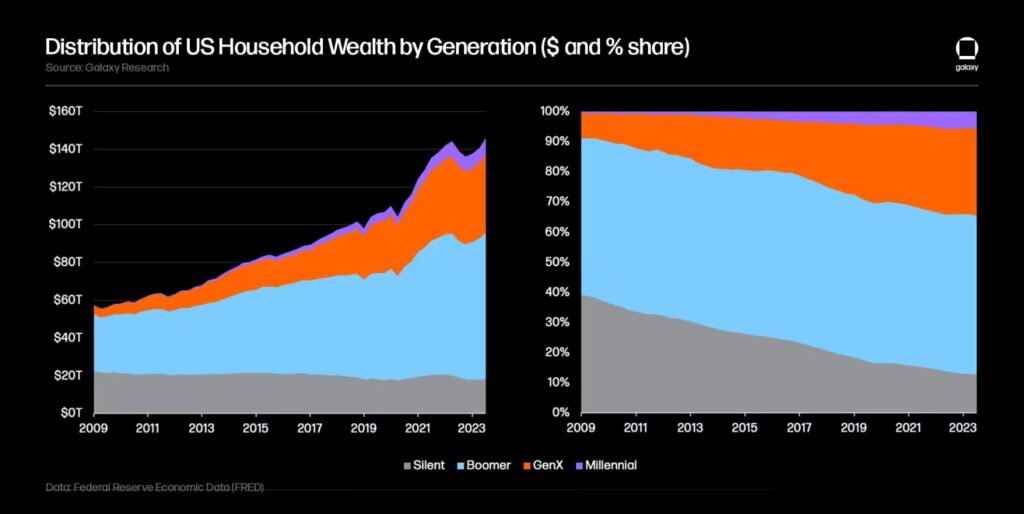Will the inheriting Millenials pump Crypto in the coming decade?
Galaxy Digital, a Venture Capital Firm, delved into the fascinating realm of generational trends within crypto investing.
Given the aging Boomers and Gen-X, the follow questions matter:
- How will wealth traverse the generational spectrum?
- And how do investment inclinations vary across different age groups?
Let’s start by dissecting how generations are typically categorized in the US:
- Silent Generation (approximately 1925 to 1945)
- Baby Boomers (approximately 1946 to 1960)
- Gen X (approximately 1961 to 1980)
- Millennials (approximately 1981 to 1996)
- Gen Z (approximately 1997 to 2012)
Now, you might be wondering, why do we bother with these generational labels? Does it truly make sense to group individuals this way? What difference does a couple of years make in determining generational identity?

According to Strauss and Howe, authors of the influential book “The Fourth Turning,” it does. Their central argument suggests that history follows a cyclical pattern rather than a linear or random one. Recent American history can be divided into cycles of roughly 80 years, known as a saeculum, each comprising four seasons or ‘turnings.’
There’s the High period (spring), an “Awakening” (summer), followed by the “Unraveling” (fall) as institutions begin to decline, ultimately leading to the Crisis (winter) that marks the culmination of the cycle, paving the way for a new saeculum.
We currently find ourselves amidst the Fourth Turning, following the cycle that commenced after World War II.
Each Turning begets its own archetype of generational character: the “Prophet,” “Nomad,” “Hero,” and “Artist,” respectively. Boomers embody the role of Prophets, while Millennials step into the shoes of Heroes.
But how can generations exhibit different character traits? Well, consider the impact of growing up amidst the turmoil of a world war versus being raised in a post-war era of stability and prosperity.

Millennials, hailed as the Hero generation, are nurtured by protective parents and come of age during times of significant crisis. They are dubbed heroes by Strauss and Howe for their pivotal role in resolving such crises.
Now, you might be wondering, what crisis will Millennials tackle? Let’s circle back to the theme of finance. “The Fourth Turning” holds significant sway among crypto enthusiasts, noting the cyclical nature of financial systems, mirroring the saeculum’s length.
The current saeculum aligns with the overhaul of the financial system post-World War II, transitioning to a gold-backed dollar system established in Bretton Woods. However, this monetary framework has been unraveling for decades, with the pace of decay accelerating.
While the purchasing power of a dollar has been on a gradual decline since Bretton Woods, the process has gained momentum. Rampant federal money printing has fueled staggering increases in home and asset prices, providing a shield against monetary devaluation rather than genuine wealth accumulation. This reality confronts Millennials in ways their predecessors never experienced.

Different Generations, Different Money Mindsets
Morgan Housel, author of “The Psychology of Money,” extends generational theory to finance. He suggests that our financial upbringing shapes our money beliefs and investment approaches.
According to economist Malmendier, early adult experiences heavily influence lifelong investment decisions. For instance, those coming of age during strong stock market periods tend to invest more in stocks later on.
Consider the graph depicting stock market fluctuations from 1963 to 2000. It’s evident how different economic climates influence investment perspectives and behaviors.
Millennials Navigate Economic Challenges
While younger generations mock boomers’ crypto ignorance, both sides offer valid investment perspectives shaped by their unique experiences. Boomers advise based on their era of prosperity, while Millennials face housing market challenges and student debt.
Unlike the past, where a single modest income could afford a home, today’s prices deter homeownership. Millennials lag behind older generations in homeownership rates due to recession impacts and rising education costs.
As a result, Millennials and Gen Z distrust traditional financial systems, exacerbated by events like the 2008 financial crisis.

Digital Natives Embrace Crypto
Growing up in a digitally connected world, Millennials find digital assets like cryptocurrency more intuitive. Their familiarity with online interactions makes the concept of digital money less alien.
Research from Coinbase shows significantly higher crypto adoption among Millennials compared to Boomers. This trend indicates a generational shift towards digital assets.
Implications for Crypto Markets
Galaxy Digital predicts a substantial influx of wealth into crypto markets as younger generations embrace digital assets. This wealth transfer could generate significant daily buying pressure, further boosting crypto prices.
Millennials, accustomed to digital innovations, drive this shift towards crypto. They view it as more than a financial investment; it’s about reshaping the financial landscape for the future.

